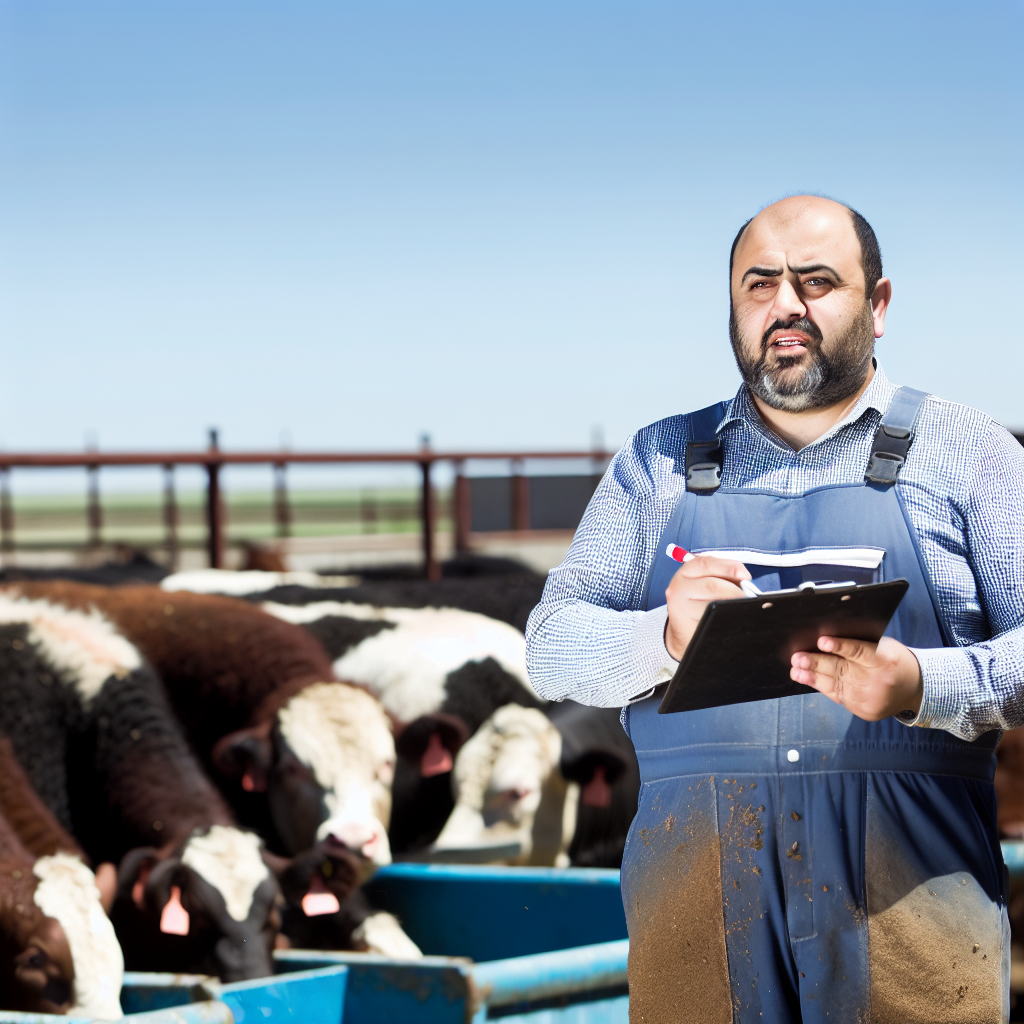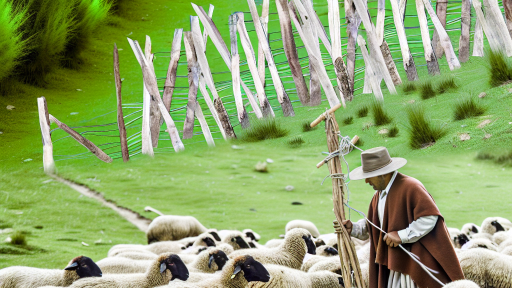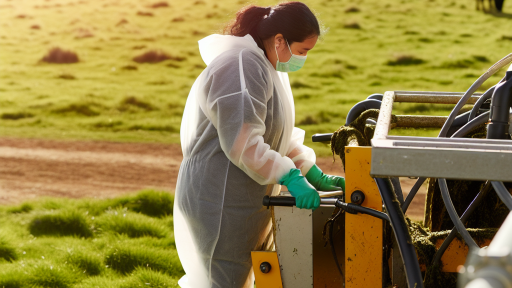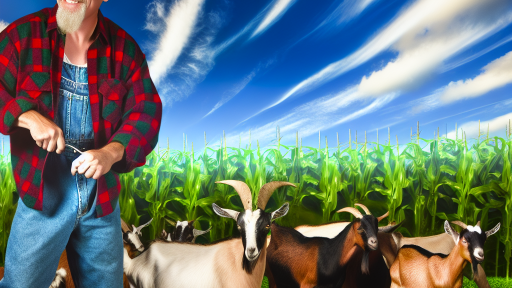Introduction to Weight Gain in Beef Cattle
Weight gain in beef cattle is crucial for efficient beef production.
This process involves various techniques and strategies to promote growth.
Farmers aim to maximize weight gain for economic benefits.
Healthy weight gain enhances market value and overall herd productivity.
Understanding Weight Gain Factors
Several factors influence weight gain in beef cattle.
Nutrition plays a central role in supporting healthy growth.
Moreover, genetics can affect growth rates and feed efficiency.
Environmental conditions also impact weight gain significantly.
Nutrition for Optimal Weight Gain
Providing a balanced diet ensures optimal weight gain.
Beef cattle require adequate protein, energy, and minerals.
Forage quality is essential to meet the nutritional needs.
Supplemental feeding may be necessary during certain seasons.
Grain-based diets can enhance weight gain in finishing cattle.
Monitoring Growth Progress
Regularly monitoring weight gain is important for cattle management.
Weighing cattle periodically helps track their growth trends.
Transform Your Agribusiness
Unlock your farm's potential with expert advice tailored to your needs. Get actionable steps that drive real results.
Get StartedUsing growth charts can assist farmers in making informed decisions.
Adjustments to diet and management practices can be implemented as needed.
Health and Management Practices
Maintaining cattle health is critical for promoting weight gain.
Vaccination programs prevent diseases that can hinder growth.
Additionally, parasite control is vital for healthy cattle.
Stress management also contributes to effective weight gain.
Importance of Nutrition in Weight Gain
Role of Nutrients
Nutrients serve as the foundation for beef cattle growth.
Protein, energy, vitamins, and minerals play critical roles.
Without adequate nutrients, growth can stagnate significantly.
For example, high-quality protein sources support muscle development.
Energy sources, such as grains, fuel daily activities and gain.
Quality of Forage
The quality of forage directly impacts weight gain.
High-quality grasses and legumes enhance nutrient absorption.
Conversely, poor-quality forage can limit growth potential.
Consider supplementing with concentrates for better performance.
Feed Composition
Balanced feed formulations optimize growth rates.
Livestock nutritionists often develop tailored rations.
For example, a mix of grains and proteins ensures energy needs.
In addition, mineral and vitamin supplements promote overall health.
Feeding Strategies
Implementing effective feeding strategies can drive gain.
Frequent feeding and consistent schedules improve intake.
Utilizing feed additives enhances digestion and nutrient absorption.
Consider methods like limit feeding or ad-libitum feeding.
Importance of Water
Access to clean water is crucial for optimal weight gain.
Showcase Your Farming Business
Publish your professional farming services profile on our blog for a one-time fee of $200 and reach a dedicated audience of farmers and agribusiness owners.
Publish Your ProfileWater supports digestion and nutrient transport in the body.
Dehydration can lead to reduced feed intake and performance.
Ensure cattle have consistent access to fresh water sources.
Monitoring Body Condition
Regularly monitoring body condition scores helps assess nutrition.
Cattle with an ideal condition score gain weight more effectively.
Adjustments to feed and care can be made based on observations.
Utilize scoring methods to guide nutritional decisions.
Seasonal Considerations
Weather conditions influence nutritional needs and weight gain.
Cattle may require different diets during winter and summer.
For instance, cold weather increases energy demands significantly.
Plan feeding practices accordingly to maintain optimal health.
Types of Feed and Their Impact on Weight Gain
Understanding Feed Types
Different types of feed significantly influence cattle weight gain.
For instance, energy-dense feeds enhance growth more effectively.
Conversely, high-fiber feeds provide less energy but maintain gut health.
Grain-Based Diets
Grain-based diets are popular for promoting rapid weight gain.
These diets include corn and barley, which are energy-packed.
Such feeds improve feed efficiency and overall weight gain.
However, they require careful management to prevent digestive issues.
Forage-Based Diets
Forage-based diets play a vital role in cattle management.
Common forages include hay, alfalfa, and pasture grasses.
These feeds are rich in fiber but have lower digestible energy.
They support ruminant health and properly balance cattle diets.
Supplementing with Protein
Protein supplements are essential for optimal growth rates.
Incorporating soybean meal or cottonseed meal helps boost protein levels.
These supplements improve muscle development and overall health.
Regular monitoring ensures adequate protein intake for cattle.
Minerals and Vitamins
Minerals and vitamins enhance feed efficiency and overall health.
Essential minerals like calcium and phosphorus support bone growth.
Additionally, vitamins play key roles in metabolic processes.
Ensuring balanced mineral and vitamin intake maximizes weight gain.
Feed Management Practices
Proper feed management maximizes weight gain and minimizes waste.
Regularly assessing feed quality ensures cattle receive the best nutrients.
Additionally, optimizing feed delivery methods enhances consumption rates.
Ultimately, managing feed availability leads to consistent weight gain.
Learn More: Selecting Breeds for Exotic Livestock Success
Role of Protein in Accelerating Weight Gain
Importance of Protein in Cattle Diets
Protein plays a crucial role in the diet of beef cattle.
It is essential for muscle development and overall growth.
Additionally, protein aids in tissue repair and maintenance.
Higher protein intake can lead to improved weight gain.
Cattle require a balance of amino acids for optimal performance.
Showcase Your Farming Business
Publish your professional farming services profile on our blog for a one-time fee of $200 and reach a dedicated audience of farmers and agribusiness owners.
Publish Your ProfileSources of Protein for Beef Cattle
Various feed options provide protein for cattle diets.
- Legumes such as alfalfa and clover offer high-quality protein.
- Corn gluten feed is another effective protein source.
- Fish meal contains essential amino acids for rapid growth.
- Soybean meal is widely used for its high protein content.
Choosing the right protein sources can enhance cattle weight gain.
Protein Supplementation Strategies
Supplementing protein can be beneficial for growing cattle.
Farmers can use commercial protein supplements as needed.
Strategically timing protein supplementation is crucial.
Providing supplements during critical growth phases maximizes benefits.
Mixing protein supplements with other feed can improve absorption.
Monitoring and Adjusting Protein Levels
Regular evaluations of cattle diets are essential.
Monitoring growth rates helps identify protein needs.
Adjusting protein levels based on performance can enhance outcomes.
Using feed analysis ensures proper protein intake for cattle.
Continuous assessment of dietary protein aligns with diet goals.
You Might Also Like: Record Keeping Tips for Sheep Farmers
Effective Feeding Strategies for Optimal Growth
Understanding Nutritional Requirements
Beef cattle thrive when provided with balanced nutrition.
They require carbohydrates, proteins, vitamins, and minerals.
Each nutrient plays a critical role in their growth and development.
Understanding these requirements helps farmers make informed decisions.
Choosing the Right Feed
Selecting the right type of feed is essential for weight gain.
Good quality forages can significantly enhance cattle growth.
Consider options such as alfalfa hay and silage.
Supplemental grain can also boost energy intake.
Types of Feed Ingredients
Beef cattle diets should consist of various feed ingredients.
Common choices include corn, barley, and soybean meal.
Each ingredient contributes different nutrients.
Therefore, combining them ensures a balanced diet.
Implementing Feeding Programs
Structured feeding programs improve weight gain efficiency.
Consider a ration designed to meet specific growth targets.
Monitor body condition scores to adjust feeding strategies.
Frequent analyses can help optimize feeds over time.
Adjustments During Different Growth Stages
Cattle nutritional needs change as they grow.
Adjust feed compositions based on their age and weight class.
Growing calves require different rations than finishing cattle.
Being flexible in management enhances growth potential.
Utilizing Feed Additives
Feed additives can enhance nutrient absorption.
Additives such as probiotics support digestive health.
Moreover, ionophores may improve feed efficiency.
These supplements can provide tangible benefits for weight gain.
Monitoring and Adjusting Feeding Practices
Regularly monitor weight and growth rates of cattle.
Keep records to identify trends and adjust strategies accordingly.
If growth is slower than expected, re-evaluate the diet.
Showcase Your Farming Business
Publish your professional farming services profile on our blog for a one-time fee of $200 and reach a dedicated audience of farmers and agribusiness owners.
Publish Your ProfileImplement necessary changes to optimize outcomes over time.
Importance of Water Access
Free access to clean water is vital for cattle health.
Hydration impacts appetite and digestion significantly.
Ensure that cattle can easily access water at all times.
Consistent water supply supports overall weight gain efficiency.
Discover More: Common Challenges in Livestock Handling Solutions
Utilization of Supplements to Enhance Weight Gain
Importance of Feed Supplements
Feed supplements play a crucial role in enhancing weight gain in beef cattle.
They provide essential nutrients that might be lacking in a cattle’s regular diet.
Additionally, they help improve overall health and increase productivity.
Types of Feed Supplements
Various types of feed supplements can significantly impact weight gain.
- Protein supplements are essential for muscle development.
- Energy-dense feeds supply the necessary calories for growth.
- Minerals and vitamins support immune function and overall health.
Protein Supplements
Protein supplements are vital for optimizing weight gain.
They aid in muscle development and tissue repair.
Common sources of protein supplements include soybean meal and distillers grains.
Feeding these can increase average daily gain significantly.
Energy-Dense Feeds
Energy-dense feeds provide the necessary calories for weight gain.
Incorporating grains such as corn can boost energy levels.
Ensuring cattle have access to high-quality forages is also beneficial.
Minerals and Vitamins
Minerals and vitamins play an essential role in cattle nutrition.
They support immune systems and enhance overall health.
Important minerals include calcium, phosphorus, and selenium.
Using fortified mineral blocks can ensure adequate intake.
Feeding Strategies
Implementing effective feeding strategies maximizes supplement benefits.
Adjust rations based on age, weight, and stage of growth.
Regularly assess the cattle’s weight and adjust feed accordingly.
Consulting with a nutritionist can help create tailored feeding programs.
See Related Content: Environmental Impact Of Livestock Waste Disposal

Management Practices for Improving Weight Gain
Nutritional Strategies
Provide a balanced diet rich in energy and protein.
Include high-quality forage and grains in their feed.
Monitor feed conversion rates carefully.
Utilize feed additives to enhance growth performance.
Implement a feeding schedule to ensure consistent nutrient intake.
Health Management
Regular veterinary check-ups are essential for health maintenance.
Vaccination programs should be strictly followed.
Monitor for signs of disease or parasites regularly.
Implement a biosecurity plan to prevent disease outbreaks.
Breeding Practices
Choose bulls with superior genetics for breeding purposes.
Consider performance data when selecting breeding stock.
Practice controlled breeding to improve offspring quality.
Environmental Conditions
Ensure cattle have access to clean water at all times.
Provide adequate shelter from extreme weather conditions.
Showcase Your Farming Business
Publish your professional farming services profile on our blog for a one-time fee of $200 and reach a dedicated audience of farmers and agribusiness owners.
Publish Your ProfileMaintain clean and dry living environments to reduce stress.
Implement rotational grazing to enhance grass quality.
Behavioral Aspects
Minimize stress during handling and transportation of cattle.
Use low-stress handling techniques during routines.
Encourage social interactions among cattle to promote natural behavior.
Keep noise levels low to maintain a calm environment.
Monitoring and Measuring Weight Gain Progress
Importance of Monitoring Weight Gain
Regular monitoring of weight gain helps assess cattle health.
It enables farmers to make informed management decisions.
Consistent tracking can optimize feeding strategies.
Methods for Measuring Weight
Farmers commonly use scales for accurate measurements.
Portable scales offer versatility in various settings.
Incorporating weigh tapes can also provide useful estimates.
Automated systems facilitate continuous monitoring.
Establishing Baseline Weight
Determining the baseline weight establishes a reference point.
This initial measurement aids in evaluating growth rates.
Documenting starting weight ensures accurate tracking.
Calculating Average Daily Gain
Average Daily Gain (ADG) is crucial for performance evaluations.
ADG is calculated by subtracting starting weight from ending weight.
Then, divide that number by the number of days on feed.
This calculation reveals the effectiveness of feeding programs.
Using Technology for Monitoring
Technology enhances the efficiency of weight measurement.
Smart collars and GPS systems provide real-time data.
Apps can aggregate and analyze weight data for trends.
Investing in these technologies can improve decision-making.
Record Keeping Practices
Maintaining accurate records supports better tracking.
Include dates, weights, and feeding changes in your logs.
Regular review of records helps identify patterns and issues.
Consider using digital databases for easy access and analysis.
Common Challenges in Achieving Desired Weight Gain
Nutritional Deficiencies
Nutritional deficiencies often hinder weight gain in beef cattle.
Cattle require a balanced diet rich in protein and energy.
Insufficient minerals can negatively impact growth rates.
Moreover, vitamin deficiencies lead to poor health and productivity.
Inadequate Feeding Practices
Inadequate feeding practices can significantly affect weight gain.
Cattle need regular feeding schedules for optimal growth.
The choice of feed plays a crucial role in meeting their nutritional needs.
Overlooking feed quality can lead to poor weight performance.
Health Issues
Health issues can severely impact weight gain in cattle.
Illnesses reduce appetite and overall feeding efficiency.
Parasitic infections are common culprits leading to weight loss.
Regular veterinary check-ups help maintain herd health and growth rates.
Showcase Your Farming Business
Publish your professional farming services profile on our blog for a one-time fee of $200 and reach a dedicated audience of farmers and agribusiness owners.
Publish Your ProfileEnvironmental Stressors
Environmental stressors can pose challenges to achieving desired weight gain.
Extreme weather conditions stress cattle, impacting their health.
Overcrowding can lead to competition for food and water resources.
Providing adequate shelter can mitigate some environmental stress effects.
Genetic Factors
Genetic factors also influence weight gain potential.
Some breeds naturally grow faster than others.
Selecting the right breed for desired production goals is essential.
Furthermore, genetic testing can guide breeding decisions effectively.
Management Practices
Poor management practices can hinder weight gain in beef cattle.
Consistent monitoring of animal health and nutrition is crucial.
Implementing efficient management strategies enhances growth performance.
Additionally, maintaining detailed feeding records can improve decisions.
Best Practices for Beef Cattle Weight Gain
Understanding Nutritional Needs
Providing balanced nutrition is fundamental for weight gain.
Cattle require a mix of energy, protein, vitamins, and minerals.
Regularly evaluate the forage quality in their diet.
Forage alone may not meet energy demands during growth phases.
Consider supplementing with grain or protein sources as needed.
Implementing Effective Feeding Strategies
Adopt a feeding schedule that promotes consistent growth.
Using high-quality feed can significantly accelerate weight gain.
Monitor the cattle’s intake to ensure they are eating enough.
Offering feed in multiple locations can reduce competition among cattle.
Monitoring Health and Well-Being
Regular health checks are critical for optimizing weight gain.
Look for signs of illness or discomfort in the herd.
Vaccination programs will help prevent health issues.
Strong parasite control measures are also essential for cattle health.
Creating a Comfortable Environment
A proper living environment can enhance weight gain rates.
Ensure that cattle have access to clean water at all times.
Provide adequate shelter to protect against extreme weather conditions.
Sufficient space reduces stress and promotes natural grazing behavior.
Utilizing Record Keeping
Keep detailed records of cattle weight and feeding regimens.
Data analysis can reveal patterns and areas for improvement.
Tracking vaccination and health history helps identify trends.
This information supports more informed decision-making overall.
Implementing Genetics and Breeding Strategies
Consider using selective breeding for superior weight gain traits.
Focus on traits such as feed efficiency and growth rate.
Partnering with experienced breeders may yield better results.
Genetics play a significant role in lifetime weight gain potential.
Engaging in Continuous Learning
Stay updated with the latest research in cattle nutrition.
Attend workshops and seminars focused on cattle management.
Networking with other cattle producers can provide valuable insights.
Showcase Your Farming Business
Publish your professional farming services profile on our blog for a one-time fee of $200 and reach a dedicated audience of farmers and agribusiness owners.
Publish Your ProfileRemain open to adapting strategies based on new findings.
Additional Resources
Castrating Beef Calves | New Mexico State University – BE BOLD …
Structure, Management Practices, and Production Costs of U.S. Beef …




